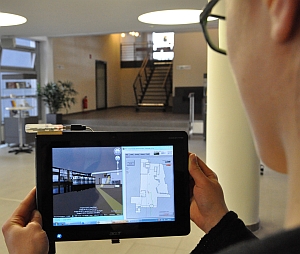
In addition to identifying an individual's precise location, the module can recommend an ideal walk route if desired. The amazing part is that the module does not need to be calibrated by the user, but rather the device is able to gauge stride length on its own. The module uses a series of sensors including an acceleration sensor that tracks the motion of the body, and a magnetic field sensor that measures the alignment of the body through its position relative to the earth's magnetic field. These two sensors work together to map a precise pattern of movement. MST has its own processor built-in, and is the size of a fingernail, and thus could work with nearly any mobile device including tablets and smartphones.
Source:
http://techcrunch.com/2012/05/04/lost-in-the-supermarket-a-new-sensor-will-navigate-for-you-indoors/
http://sciencebusiness.technewslit.com/?p=9314&utm_source=rss&utm_medium=rss&utm_campaign=navigation-module-for-inside-buildings-in-development
